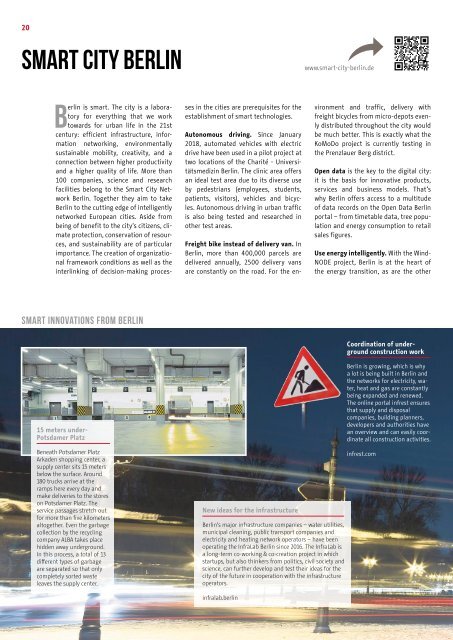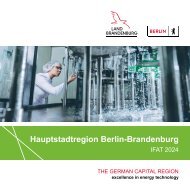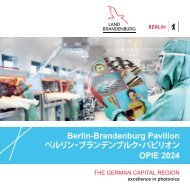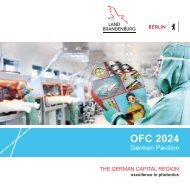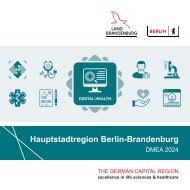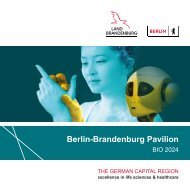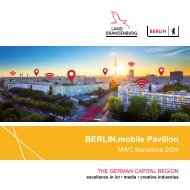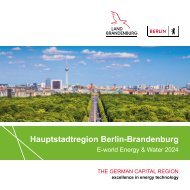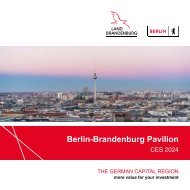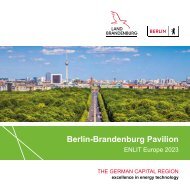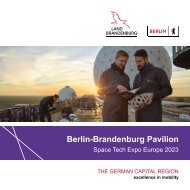Berlin: Your Business Location
You also want an ePaper? Increase the reach of your titles
YUMPU automatically turns print PDFs into web optimized ePapers that Google loves.
20<br />
Smart City <strong>Berlin</strong><br />
B<br />
erlin is smart. The city is a laboratory<br />
for everything that we work<br />
towards for urban life in the 21st<br />
century: efficient infrastructure, information<br />
networking, environmentally<br />
sustainable mobility, creativity, and a<br />
connection between higher productivity<br />
and a higher quality of life. More than<br />
100 companies, science and research<br />
facilities belong to the Smart City Network<br />
<strong>Berlin</strong>. Together they aim to take<br />
<strong>Berlin</strong> to the cutting edge of intelligently<br />
networked European cities. Aside from<br />
being of benefit to the city‘s citizens, climate<br />
protection, conservation of resources,<br />
and sustainability are of particular<br />
importance. The creation of organizational<br />
framework conditions as well as the<br />
interlinking of decision-making processes<br />
in the cities are prerequisites for the<br />
establishment of smart technologies.<br />
Autonomous driving. Since January<br />
2018, automated vehicles with electric<br />
drive have been used in a pilot project at<br />
two locations of the Charité - Universitätsmedizin<br />
<strong>Berlin</strong>. The clinic area offers<br />
an ideal test area due to its diverse use<br />
by pedestrians (employees, students,<br />
patients, visitors), vehicles and bicycles.<br />
Autonomous driving in urban traffic<br />
is also being tested and researched in<br />
other test areas.<br />
www.smart-city-berlin.de<br />
Freight bike instead of delivery van. In<br />
<strong>Berlin</strong>, more than 400,000 parcels are<br />
delivered annually, 2500 delivery vans<br />
are constantly on the road. For the environment<br />
and traffic, delivery with<br />
freight bicycles from micro-depots evenly<br />
distributed throughout the city would<br />
be much better. This is exactly what the<br />
KoMoDo project is currently testing in<br />
the Prenzlauer Berg district.<br />
Open data is the key to the digital city:<br />
it is the basis for innovative products,<br />
services and business models. That‘s<br />
why <strong>Berlin</strong> offers access to a multitude<br />
of data records on the Open Data <strong>Berlin</strong><br />
portal – from timetable data, tree population<br />
and energy consumption to retail<br />
sales figures.<br />
Use energy intelligently. With the Wind-<br />
NODE project, <strong>Berlin</strong> is at the heart of<br />
the energy transition, as are the other<br />
SMART INNOVATIONS FROM BERLIN<br />
15 meters under-<br />
Potsdamer Platz<br />
Coordination of underground<br />
construction work<br />
<strong>Berlin</strong> is growing, which is why<br />
a lot is being built in <strong>Berlin</strong> and<br />
the networks for electricity, water,<br />
heat and gas are constantly<br />
being expanded and renewed.<br />
The online portal infrest ensures<br />
that supply and disposal<br />
companies, building planners,<br />
developers and authorities have<br />
an overview and can easily coordinate<br />
all construction activities.<br />
Beneath Potsdamer Platz<br />
Arkaden shopping center, a<br />
supply center sits 15 meters<br />
below the surface. Around<br />
180 trucks arrive at the<br />
ramps here every day and<br />
make deliveries to the stores<br />
on Potsdamer Platz. The<br />
service passages stretch out<br />
for more than five kilometers<br />
altogether. Even the garbage<br />
collection by the recycling<br />
company ALBA takes place<br />
hidden away underground.<br />
In this process, a total of 13<br />
different types of garbage<br />
are separated so that only<br />
completely sorted waste<br />
leaves the supply center.<br />
New ideas for the infrastructure<br />
<strong>Berlin</strong>‘s major infrastructure companies – water utilities,<br />
municipal cleaning, public transport companies and<br />
electricity and heating network operators – have been<br />
operating the InfraLab <strong>Berlin</strong> since 2016. The InfraLab is<br />
a long-term co-working & co-creation project in which<br />
startups, but also thinkers from politics, civil society and<br />
science, can further develop and test their ideas for the<br />
city of the future in cooperation with the infrastructure<br />
operators.<br />
infrest.com<br />
infralab.berlin


